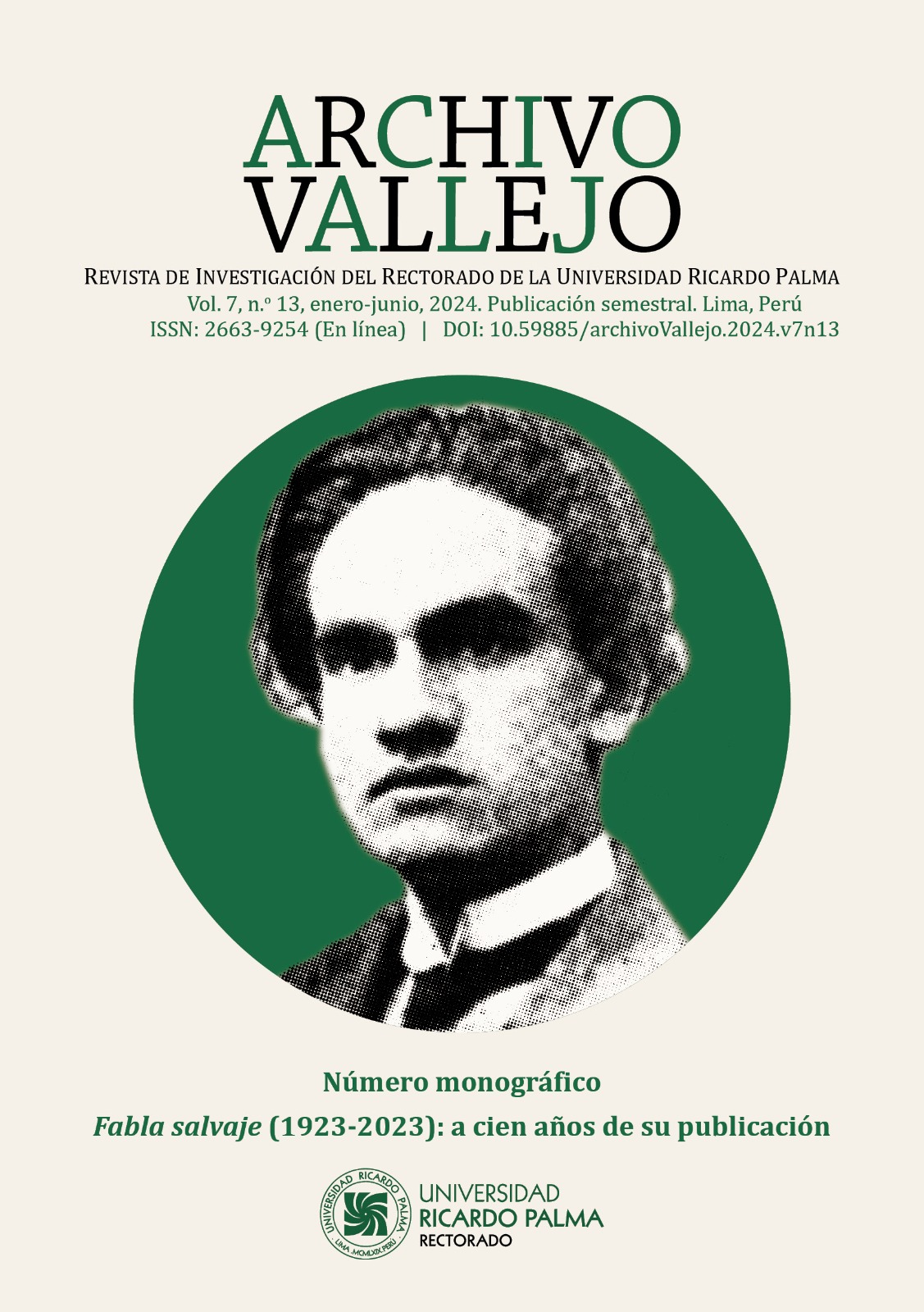La muerte literaria y la muerte legal en Fabla salvaje
DOI:
https://doi.org/10.59885/archivoVallejo.2024.v7n13.01Palabras clave:
vida, muerte, libertad, suicidio, muerte accidental presuntaResumen
En este artículo se analiza la novela corta Fabla salvaje, publicada en 1923, en la que su autor, César Vallejo, desarrolla la historia de Balta Espinar, un joven agricultor que resulta cautivo de una superstición de anuncio de tragedia desatada por la rotura accidental de un espejo, hecho que perjudica su salud mental y le genera un delirio de persecución de un «ser invisible» e inexistente, como su propio doble; y que lo sumirá en un estado de ánimo depresivo, de desconfianza y de fatalismo, que modifica su conducta con su esposa, con quien se torna hosco, con celos infundados, causándole sufrimiento. Esta superstición, que se refuerza con el canto de una gallina y de dos búhos, cambia la actitud del protagonista frente al mundo y la vida, conduciéndolo a la muerte. El presente estudio se llevará a cabo desde la perspectiva de una interpretación literario-jurídica, especialmente de las figuras de la libertad y la muerte.
Citas
Abril, X. (2012). La idea del «doble» en Vallejo. En O. Aramayo y M. Guzmán (eds.), Vallejo: antología y análisis de su obra. Tomo I (pp. 155-175). Universidad Alas Peruanas.
Bendezú, E. (1992). La novela peruana. De Olavide a Bryce. Editorial Lumen.
Cabanellas, G. (1989). Diccionario enciclopédico de derecho usual. Tomos V y VII. Editorial Heliasta.
Castro, M. (1970). La novela peruana y la evolución social. José Godard Editor.
González Montes, A. (1993). La narrativa de César Vallejo. En R. González Vigil (ed.), Intensidad y altura de César Vallejo (pp. 221-263). Pontificia Universidad Católica del Perú.
González Vigil, R. (1998). Prólogo. En C. Vallejo, Novelas y cuentos completos (pp. 7-33). Ediciones Copé.
Ministerio de Justicia (2007 [1984]). Código Civil [Decreto Legislativo n.° 295]. Lima: 24 de julio de 1984.
Portocarrero, J. (2007). Prólogo. En Ministerio de Justicia, Código Penal (pp. 3-7). Ministerio de Justicia; Editora Perú.
Real Academia Española (2014). Espinar [como sustantivo y verbo]. En Diccionario de la lengua española. Recuperado de: https://dle.rae.es/espinar?m=form
Silva-Santisteban, R. (2004). César Vallejo y su creación literaria. En C. Vallejo, Obras esenciales (pp. 11-116). Pontificia Universidad Católica del Perú.
Vallejo, C. (2020 [1923]). Fabla salvaje [edición facsimilar]. Universidad Ricardo Palma.
Vidal, F. (2000). El derecho civil en sus conceptos fundamentales. Gaceta Jurídica.
Publicado
Cómo citar
Número
Sección
Licencia
Derechos de autor 2024 Iván Rodríguez Chávez

Esta obra está bajo una licencia internacional Creative Commons Atribución 4.0.
Los contenidos publicados en la revista están bajo una licencia CC-BY 4.0, la cual permite:
- Compartir, copiar y redistribuir el material en cualquier medio o formato.
- Adaptar, remezclar, transformar y construir a partir del material para cualquier propósito, incluso comercialmente.
Bajo los siguientes términos:
- Atribución. Usted debe dar crédito de manera adecuada, brindar un enlace a la licencia, e indicar si se han realizado cambios. Puede hacerlo en cualquier forma razonable, pero no de forma tal que sugiera que usted o su uso tienen el apoyo de la licenciante.















